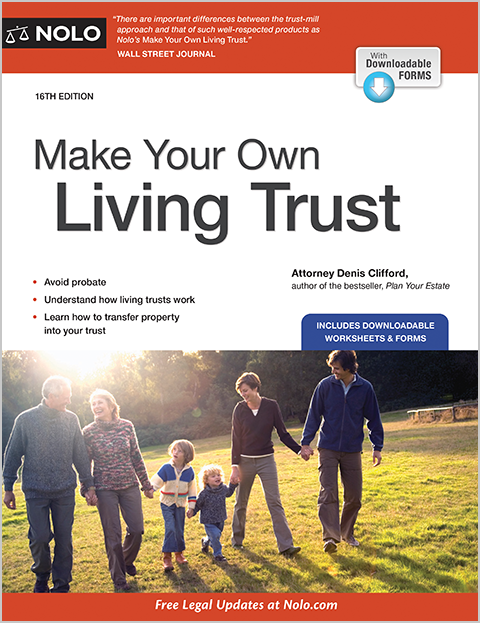 Living Trusts
Living Trusts
Avoiding probate court proceedings after your death can save your family time, money, and headaches. Revocable living trusts are the only probate-avoidance technique that allows you to avoid probate for virtually any property you own: real estate, jewelry, heirlooms, bank accounts, and much more.
Revocable living trusts function like wills--you use them to leave your property, and if you change your mind at any time while you're alive, you can change the terms of the trust or revoke it altogether. The advantage comes at your death. Property in the trust is controlled by the person you named to take over as successor trustee, and that person has the power to distribute the property to inheritors without any probate court involvement. That saves everyone a lot of work and gets property to the people you chose to inherit it much more quickly.
Ready to create your will?
Select your state to learn about your state's laws.
Alabama
Alaska
Arizona
Arkansas
California
Colorado
Connecticut
Delaware
D.C.
Florida
Georgia
Hawaii
Idaho
Illinois
Indiana
Iowa
Kansas
Kentucky
Maine
Maryland
Massachusetts
Michigan
Minnesota
Mississippi
Missouri
Montana
Nebraska
Nevada
New Hampshire
New Jersey
New Mexico
New York
North Carolina
North Dakota
Ohio
Oklahoma
Oregon
Pennsylvania
Rhode Island
South Carolina
South Dakota
Tennessee
Texas
Utah
Vermont
Virginia
Washington
West Virginia
Wisconsin
Wyoming
Living Trusts in Your State
Select your state to learn about your state's laws.
- Alabama
- Alaska
- Arizona
- Arkansas
- California
- Colorado
- Connecticut
- Delaware
- D.C.
- Florida
- Georgia
- Hawaii
- Idaho
- Illinois
- Indiana
- Iowa
- Kansas
- Kentucky
- Maine
- Maryland
- Massachusetts
- Michigan
- Minnesota
- Mississippi
- Missouri
- Montana
- Nebraska
- Nevada
- New Hampshire
- New Jersey
- New Mexico
- New York
- North Carolina
- North Dakota
- Ohio
- Oklahoma
- Oregon
- Pennsylvania
- Rhode Island
- South Carolina
- South Dakota
- Tennessee
- Texas
- Utah
- Vermont
- Virginia
- Washington
- West Virginia
- Wisconsin
- Wyoming
An introduction to living trusts—a popular way to avoid probate.
You've heard that you should avoid probate—but why? Here are the basics.
It's about as easy to prepare a living trust as it is to write a will. But with a living trust, you can avoid probate.
Some people need a living trust immediately, others will never need one, and most of us fall somewhere in the middle. Factors to consider are how old you are, how wealthy you are, and whether you are married.
Revocable living trusts are a popular estate planning tool that you can use to determine who will get your property when you die.
The main reason for setting up a revocable living trust is to save your family time and money by avoiding probate after your death. But there are other benefits as well.
One of the advantages of using a living trust, instead of a will, to leave the bulk of your property is that it gives your family more privacy.
Living trusts are useful for estate planning, but you'll need to take other steps to shield assets.
A reverse mortgage offers additional income or cash to cover unanticipated expenses. Can you use one if your home is in your living trust? Can you add it to your trust is part of your estate plan?
Many people don't need a lawyer to create a living trust.
Living trusts aren't as complicated as they sound. Here are the few steps you need to make one.
For the greatest benefit, hold your most valuable property items in your living trust.
When you create a simple living trust to avoid probate, you must decide who to name as your “successor trustee.” It’s an important decision; this is the person who will take charge of the trust assets after your death, or sooner if you someday become incapacitated and unable to manage things yourself.
Funding Your Living Trust Once you’ve made a living trust, there’s one mo
This sample living trust uses fictional names and situations.
You can change the terms of your living trust, or revoke it, at any time.
Empower Yourself: DIY Products by Nolo
Sidestep the lawyers with do-it-yourself books, documents, and software.
Online Form
Quicken WillMaker & Trust by Nolo
Online Form
Amendment to Living Trust
Nolo offers hundreds of consumer-friendly, do-it-yourself legal products for all types of legal situations. Browse our full product list.
More Legal Issues
Click below to view more legal issues. Our extensive collection of legal topics ranges across different areas of practice.
Corporations Car Accidents Criminal Law Debt Management Disability Law Divorce & Family Law

Learn About Our Team
Our editors have over 100 years of combined experience practicing law. These professionals have worked in a wide range of legal areas, from estate planning to criminal law to business formation and beyond. They’re experts at explaining complicated legal issues in easy-to-understand terms.
Learn more about the team that manages Nolo’s articles, books, and DIY tools.
Need a Lawyer? We Can Help
Find an experienced, local attorney in three easy steps. Our process is designed for ease and simplicity.
Describe Your Case
Briefly tell us about your case, and provide your contact information.
Get Connected
We find and instantly list attorneys that can best handle your case.
Hire an Attorney
Choose the attorneys you would like to work with.
Nolo Legal Dictionary
Find plain-English definitions for legal terms by browsing Nolo's Law Dictionary.
Are You an Attorney?
Grow your firm with Martindale-Nolo, the largest legal network, and learn more about our attorney lead-generation and marketing services.
Integrity and Expertise You Can Rely On
At Nolo, we prioritize quality and transparency because we know how important reliable legal information is to our readers. Our information is meticulously researched, regularly updated, and written in plain English by our experienced writers and editors. Learn more about our editorial standards.




